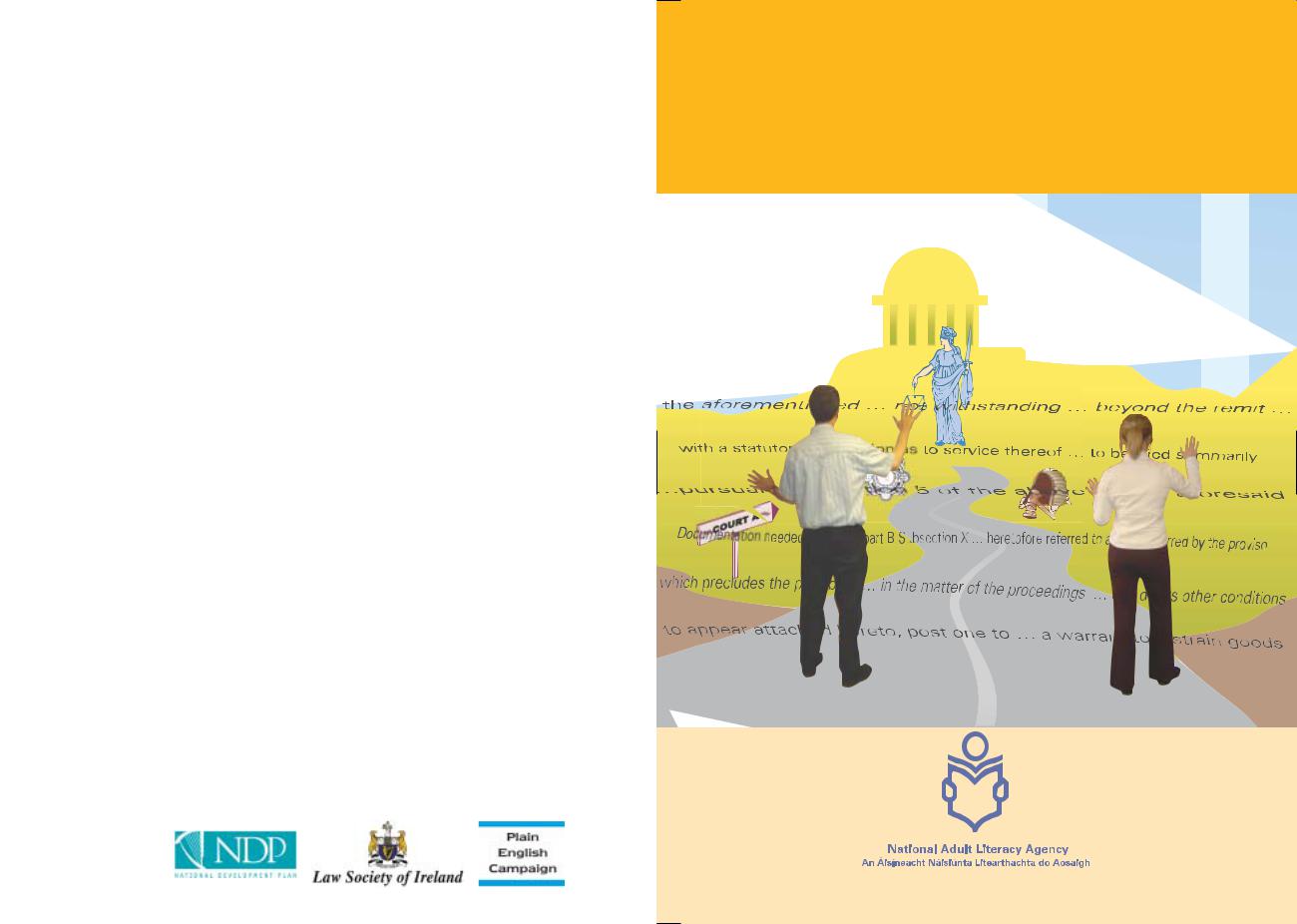
Patrick O’Connor - A Plain English Guide to Legal Terms
.pdf
A Plain English Guide to Legal Terms
01 855 4332 • literacy@nala.ie • www.nala.ie

A Plain English Guide to Legal Terms
2003

A Plain English Guide to Legal Terms
Published by
National Adult Literacy Agency
76 Lower Gardiner Street,
Dublin 1.
© 2003 National Adult Literacy Agency
The copyright in this guide belongs to the
National Adult Literacy Agency.
ISBN 1-871737-29-x
The views expressed in this publication are not necessarily the views of the National Adult Literacy Agency.

Introduction
The language used in law is changing. There are many legal phrases that non-lawyers don’t understand. This guide is intended to help non-lawyers understand legal phrases and to give lawyers guidance in explaining the legal phrases they use. Although it comprises over 60 pages with over 1,400 words explained, this is not a complete dictionary of legal terms in use in Ireland.
The explanations in this guide are not intended to be alternatives. Lawyers will continue to use legal phrases when necessary. This publication is designed to explain ideas and concepts rather than to give legal definitions.
We invite your suggestions for additions. Please e-mail us at literacy@nala.ie with your ideas.
The National Adult Literacy Agency (NALA) would like to thank Patrick O’Connor, B.C.L., LL.B., Solicitor of Swinford, County Mayo who edited the legal content of the guide.
He was President of the Law Society of Ireland in 1999.
NALA would also like to thank:
●The Plain English Campaign in the UK for providing the bulk of the initial information from their ‘A to Z of legal terms in plain English’.
●Kieron Wood for making available ‘Glossary of legal terms’ from his website (http://welcome.to/barrister) as a reference point from his website.
●The Office of the Director of Public Prosecutions for their ‘Glossary of Legal terms’.
3


A Plain English Guide to Legal Terms
A |
(of a law) |
|
Ab initio* |
||
|
||
From the |
to present |
|
Abandonment |
||
the court |
||
Giving up a |
|
|
Abatement |
|
|
● Cancelling |
unconditional. |
|
● stopping a |
|
|
● reducing the |
property |
|
creditors in |
||
|
||
there is not |
|
|
pay them in |
can be used in |
|
● reducing the |
||
if the |
||
proportion, |
||
which the |
||
enough money |
||
was: made in |
||
full. |
||
Oireachtas |
||
Abduction |
||
fair and |
||
Taking someone |
reporting of |
|
or made |
||
Abovementioned |
||
proceedings. |
||
Describing |
|
|
has been |
summarising the |
|
the document |
||
property. |
||
|
Please note:
Words marked * are Latin in origin
Words marked † are French in origin
5

A Plain English Guide to Legal Terms
Abuse of process
When court proceedings are brought against a person without any good reason and with malice.
Abuttals
The parts of the boundaries of a piece of land which touch land alongside.
Acceptance
When an offer is accepted unconditionally a legally binding agreement is created.
Acceptance of service
When a solicitor accepts court proceedings on behalf of a client.
Acceptor
The organisation which will pay the cheque or bill of exchange it has accepted.
Accessory
Someone who encourages or helps another person to commit a crime.
Accomplice
Someone who helps another person to commit a crime.
Accounts
The record of spending and financial situation.
Accumulation
Reinvesting income generated by a fund back into the fund.
Accused
The person charged with a criminal offence.
Acknowledgement
Admitting that someone has a claim or admitting that a debt exists.
Acquiescence
Action or inaction which legally binds someone.
Acquit
When a court lets a person go without any penalty. If a court decides that a person is not guilty of a crime, or the case has not been proved, it will acquit the person.
Acquittal
The court's decision that a person is innocent of the crime they were charged with.
Act of bankruptcy
An act which, if carried out by a person with debts, could have led to bankruptcy
proceedings against that person.
Act of God
An event resulting from natural causes without human intervention (such as floods or earthquakes).
Action
Proceedings in a civil court.
6

Active trust
Active trust
A trust where the trustees have other responsibilities rather than to just let the beneficiaries have the trust's assets when they ask for them.
Actual loss
An insurance term which means that the insured item no longer exists.
Actuary
An expert on pension scheme assets and liabilities, life expectancy and probabilities (the likelihood of things happening) for insurance purposes.
Actus reus*
An act which is illegal,
Ad hoc*
For a particular purpose.
Ad idem*
In agreement.
Ad infinitum*
Endlessly or forever.
Ad interim*
For the time being.
Ad valorem*
In proportion to the value.
Additional voluntary contribution (AVC)
Extra money people in occupational pension schemes can pay in to increase their pension benefits.
Ademption
When a gift in a will cannot be made because the item no longer exists.
Adjourned sine die
When a court case has no date fixed for it to continue.
Adjournment
Postponing a court hearing.
Adjudge
To give an official judgement about something.
Adjudication
Formal judgment or decision of a court.
Administrative law
Law which applies to hearings before quasi-judicial or administrative tribunals.
Administrator
Someone who has been appointed to manage the estate of someone who has died without leaving a will.
Admissibility of evidence
Evidence which can be presented in court.
7

A Plain English Guide to Legal Terms
Admission
One side in a case agreeing that something the other side has alleged is true.
Admonition
Reprimanding of a defendant by a judge.
Adoption
The system which people use to become parents even though they are not the child's natural parents.
Adoptive child
A child who has been legally adopted.
Adoptive parent
A person who has legally adopted a child.
ADR
Alternative dispute resolution such as arbitration, mediation and conciliation.
Adverse possession
Occupying of land, without legal title for long enough – normally 12 years – to be recognized as the legal owner ("squatter's rights").
Adverse witness
A witness who gives evidence which damages the case of the side which asked the witness to testify for them.
Advocate
The lawyer who speaks in court for a client.
Affidavit
A written statement which is sworn to be true by the person signing it.
Affirm
Solemnly promise to tell the truth in court or in an affidavit.
Affirmation
Solemnly promising to tell the truth when giving evidence.
Affray
Fighting unlawfully.
Aforementioned
Describing something referred to previously in a document.
Aforesaid
Describing something which has been said or referred to before in a document.
Age of consent
The age when a girl can consent to have sexual intercourse.
Agency
The relationship between a principal and an agent.
Agent
Person with power to contract or act on behalf of others.
8

Aggravated assault
Aggravated assault
A serious type of assault.
Aggravated damages
Exceptional damages awarded by a court where a defendant's behaviour towards the plaintiff or victim has been particularly humiliating, malicious or vindictive.
Aider and abettor
One who advises or encourages the commission of a crime.
Aiding and abetting
Helping someone to commit a crime.
Airspace
The space in the atmosphere directly above a piece of land.
Alias
A false name.
Alien
Someone from a foreign country.
Alienation
Transferring the ownership of property from one person to another.
All and sundry
Everybody.
All that
Words used in a conveyance to introduce the description of the property which is being transferred.
Allegation
An unproved statement declaring that something has happened.
Alleviate
To lessen.
Allocation rate
The proportion of money left to be invested after charges have been taken off when money is paid into a fund.
Allotment
Shares allocated to a buyer.
Alternate director
A person appointed by a director to take the director's place.
Alternative dispute resolution
Method by which disputes are resolved, other than through litigation, usually by mediation or arbitration.
Alternative verdict
A person being found guilty of a less serious crime than the one they were charged with.
9
